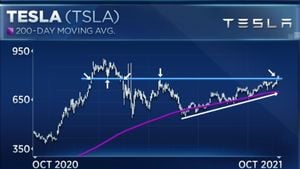Congress is currently engulfed in controversy following accusations against tech billionaire Elon Musk, primarily led by Representative Rosa DeLauro, the top Democrat on the House Appropriations Committee. On Friday, DeLauro asserted Musk's interference with government funding processes aimed at regulating U.S. investments in China, claiming his actions serve to protect his financial interests.
DeLauro's concerns emerged from what she described as Musk's significant investments and political ties with the Chinese Communist Party. "It is particularly disturbing," she wrote, "that Musk may have sought to upend this critically negotiated agreement to remove a bipartisan provision regulating U.S. investments in China to protect his wallet and the Chinese Communist Party at the expense of American workers, innovators, and businesses." This letter underscored her fears about the repercussions for U.S. technology and economic interests.
The backdrop of this confrontation is significant. Tesla, led by Musk, has investments deeply rooted in China. Notably, the Shanghai gigafactory—responsible for producing about 50% of Tesla’s global output—illustrates how intertwined Musk’s business ventures are with Chinese operations. DeLauro highlighted, "Nearly a quarter of Tesla's global revenue in 2023 drew from sales of Chinese-made vehicles from the Shanghai factory," emphasizing the financial stakes involved.
Despite Musk’s importance to U.S. business innovation, DeLauro indicated troubling patterns of behavior consistent with prioritizing personal business interests over national legislative agreements. Her accusations come at a pivotal moment, just before Congress enacted its third consecutive attempt at passing government funding extensions, leaving out provisions to screen outbound investments to China. This legislation was anticipated to limit taxpayer funding and protect key technological sectors such as semiconductors and artificial intelligence from being transferred abroad.
Following the letter, Musk took to X, the social media platform he owns, to voice his discontent, stating DeLauro "needs to be expelled from Congress!" His posts associated with his dissatisfaction seemed to focus on the overall size of the spending deal rather than the specific outbound investment provisions being critiqued. The fiery exchange, which included Musk taking aim at DeLauro's appearance, spoke volumes about the tensions escalated through social media.
Musk's investments extend beyond just Tesla's operations; the tech entrepreneur has been involved with various technological projects with well-documented connections to China. DeLauro noted, "This is particularly concerning, giving Elon Musk's extensive investments in China in key sectors and his personal ties with Chinese Communist Party leadership." These connections pose questions over Musk's motivations and the obligation he holds to the American public versus his overseas investments.
The political clash has also seen Musk appointed by President-elect Donald Trump to co-chair his government efficiency advisory panel, bringing added layers of complexity to the discussion—Musk's role has raised eyebrows considering the apparent conflict between his business dealings and public policy interests.
Despite the bipartisan push for stronger regulations on foreign investments, DeLauro's remarks allege Musk’s actions could throw those discussions off balance. "Musk’s investments have only grown over the last few years with Tesla's Shanghai plant producing about 50% of Tesla’s global automobile output," she pointed out. Such statistics only underline the visual disparity between Musk's domestic duties and his thriving ventures abroad.
While DeLauro's concerns are echoed by other lawmakers, this singular conflict pits two high profiles against each other—Musk's reputation as an innovator and visionary clashes with traditional political tenets of regulation and caution. The feedback from the Democratic Party emphasizes the need for safeguarding intrinsic American interests against what they perceive as opportunism stemming from abroad.
Both sides continue to trade barbs, evidenced by DeLauro's quip on social media, where she juxtaposed Musk’s lavishly public persona against more prudent expectations of congressional decorum, labeling him as a "swamp creature" after she shared footage of him at a Trump rally. The deteriorative relationship between the billionaire and the powerful Democrat raises questions about the influence of wealth on policy-making.
Political maneuvers surrounding this incident have far-reaching ramifications. Questions arise as to whom lawmakers primarily serve: their constituents or wealthy investors with extensive global interests. DeLauro expressed her dismay at the outcome of the funding extension, reflecting broader fears about how such foreign engagements may jeopardize U.S. innovation.
The saga surrounding Musk’s influence and perceived prioritization of profit over patriotism is still developing, and the outcome of these congressional accusations remains uncertain. What is clear, though, is the growing concern among lawmakers who believe America's financial and technological sovereignty is at stake. The question now is how congress will navigate these choppy waters and whether they can enact policies to regulate what has become increasingly complex dynamics between U.S. investment and the growing influence of foreign markets.



